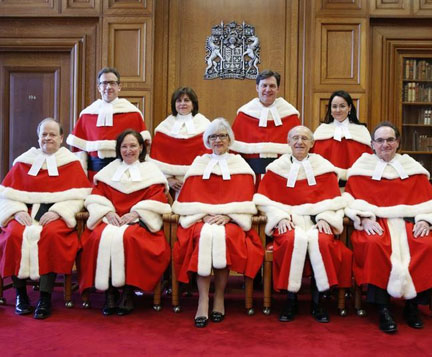This week, the Supreme Court of Canada’s spring session comes to a close. The court will hear three appeals, two of which challenge British Columbia's drunk-driving laws and the power of police officers to impose penalties at roadside stops, and another involving the paramountcy of the federal Bankruptcy and Insolvency Act over conflicting provincial statutes.
 May 19 – British Columbia – Goodwin v. British Columbia
May 19 – British Columbia – Goodwin v. British Columbia
Charter of rights: In September 2010, the B.C. legislature enacted amendments to the Motor Vehicle Act that introduced an “automatic roadside prohibition” regime. The provisions allowed police officers to issue penalties to drivers who refused to blow into a screening device, or who blew over a limit. A group of six drivers who were issued penalties under the new provisions have issued a constitutional challenge of the new regime, arguing the penalties imposed (including driving prohibitions, impoundment, fines, and the requirement of an ignition interlock device) are criminal in nature and fall outside the province’s jurisdiction. The SCC will review whether the province has overstepped its constitutional mandate.
Read the British Columbia Court of Appeal’s decision
Related news stories:
Lawyers ask Supreme Court to quash B.C.’s drunk-driving law, The Vancouver Sun
May 19 – British Columbia – Wilson v. British Columbia
Transportation law: Lee Michael Wilson was stopped at a roadside checkpoint, where he was asked to use a screening device and subsequently blew a “warn.” He then admitted that he had drunk four beers that night. The officer issued a three-day driving prohibition, which Wilson challenged, arguing the relevant legislation required proof of impairment before a penalty could be issued. The B.C. Court of Appeal ruled that the lower court, which sided with Wilson, erred and should have deferred to the regulator’s interpretation of the legislation. The SCC will weigh the scope of deference afforded the regulator against the rights afforded citizens. The case is being heard with Goodwin v. British Columbia.
Read the British Columbia Court of Appeal’s decision
Related news stories:
Supreme Court to hear cases related to B.C. roadside screening devices, The Globe and Mail
B.C. Appeal Court reinstates driving ban on drinking driver who blew a ‘warn’, The Vancouver Sun
May 21 – Saskatchewan – Saskatchewan v. Lemare Lake Logging
Constitutional law: Lemare Lake Logging, a secured creditor, applied under the Bankruptcy and Insolvency Act to have a receiver appointed over the assets of an indebted farmer. The farmer objected, arguing that the company had to first comply with Part II of the Saskatchewan Farm Security Act. Lemare argued that the principle of federal paramountcy rendered the provision inoperative. The attorney general of Saskatchewan intervened on the constitutional matter, losing at the Saskatchewan Court of Appeal.
Read the Saskatchewan Court of Appeal’s decision
 May 19 – British Columbia – Goodwin v. British Columbia
May 19 – British Columbia – Goodwin v. British ColumbiaCharter of rights: In September 2010, the B.C. legislature enacted amendments to the Motor Vehicle Act that introduced an “automatic roadside prohibition” regime. The provisions allowed police officers to issue penalties to drivers who refused to blow into a screening device, or who blew over a limit. A group of six drivers who were issued penalties under the new provisions have issued a constitutional challenge of the new regime, arguing the penalties imposed (including driving prohibitions, impoundment, fines, and the requirement of an ignition interlock device) are criminal in nature and fall outside the province’s jurisdiction. The SCC will review whether the province has overstepped its constitutional mandate.
Read the British Columbia Court of Appeal’s decision
Related news stories:
Lawyers ask Supreme Court to quash B.C.’s drunk-driving law, The Vancouver Sun
May 19 – British Columbia – Wilson v. British Columbia
Transportation law: Lee Michael Wilson was stopped at a roadside checkpoint, where he was asked to use a screening device and subsequently blew a “warn.” He then admitted that he had drunk four beers that night. The officer issued a three-day driving prohibition, which Wilson challenged, arguing the relevant legislation required proof of impairment before a penalty could be issued. The B.C. Court of Appeal ruled that the lower court, which sided with Wilson, erred and should have deferred to the regulator’s interpretation of the legislation. The SCC will weigh the scope of deference afforded the regulator against the rights afforded citizens. The case is being heard with Goodwin v. British Columbia.
Read the British Columbia Court of Appeal’s decision
Related news stories:
Supreme Court to hear cases related to B.C. roadside screening devices, The Globe and Mail
B.C. Appeal Court reinstates driving ban on drinking driver who blew a ‘warn’, The Vancouver Sun
May 21 – Saskatchewan – Saskatchewan v. Lemare Lake Logging
Constitutional law: Lemare Lake Logging, a secured creditor, applied under the Bankruptcy and Insolvency Act to have a receiver appointed over the assets of an indebted farmer. The farmer objected, arguing that the company had to first comply with Part II of the Saskatchewan Farm Security Act. Lemare argued that the principle of federal paramountcy rendered the provision inoperative. The attorney general of Saskatchewan intervened on the constitutional matter, losing at the Saskatchewan Court of Appeal.
Read the Saskatchewan Court of Appeal’s decision







